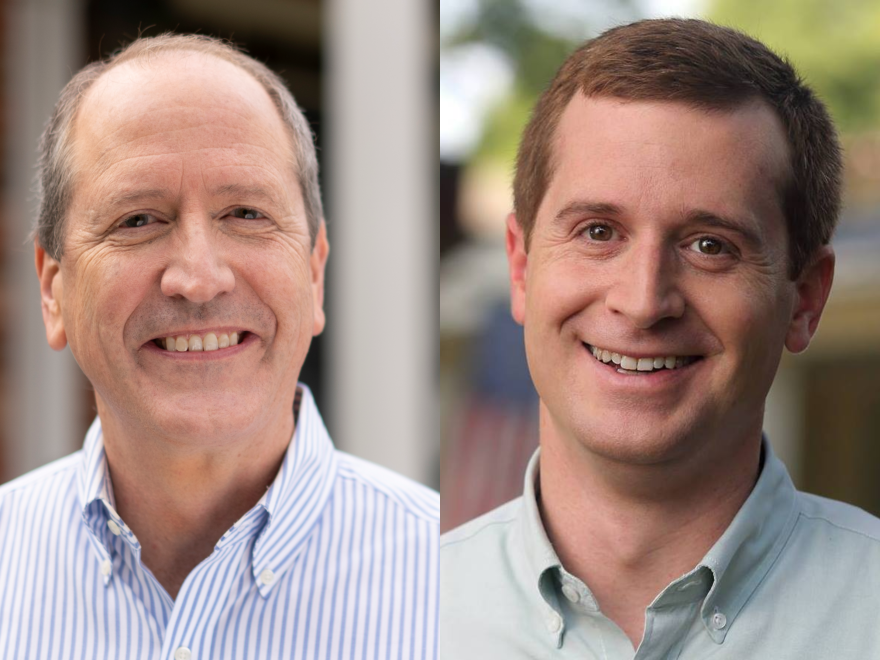The long race for North Carolina’s Ninth Congressional District is about to come to an end. Election Day is next Tuesday – and ahead of that we look at claims made against Democrat Dan McCready and his Republican opponent, Dan Bishop, in this Fact Check of North Carolina politics.

Paul Specht of the Raleigh News & Observer joins WFAE's "Morning Edition" host Lisa Worf to assess those claims.
Lisa Worf:Let’s start with a tweet from President Trump. He’ll be campaigning for Bishop in Fayetteville on Monday. He tweeted last week McCready believes in open borders and sanctuary cities. First, let’s look at the open borders part of that statement. Do we know what Trump was basing that on?
Paul Specht:We do. We reached out to his campaign and they suggested the thought process behind that tweet is because Dan McCready supports the pathway to citizenship for "dreamers," and as a reminder for those of us who can't keep up with all the immigration debate, dreamers are people who are immigrants who were brought to America as young kids, and so they don't really have another country to call their own.
And so that was the main accusation, if you will, behind the word "open borders," but otherwise we struggled to find anything in McCready's language or his website or his actions or anything that suggested he has endorsed open borders.
Worf:So is it fair to say McCready believes in open borders?
Specht:No. And we talked to experts about this too and showed them some of his quotes. He's been quoted saying that he believes it's not necessary to have a wall across the entire southern border. He likes to say that he wants to deploy some of the technology that he used in Iraq when he was a Marine at the border.
He wants to improve surveillance technology to just make Border Patrol a smarter agency — smarter, technologically speaking. So, no, it's not fair to say that he supports open borders.

Worf:What about the claim that McCready supports sanctuary cities?
Specht:That's where Trump has a little bit of a point. "Sanctuary cities" is sort of a squishy term that refers to any city that doesn't cooperate with immigration authorities. Historically it's meant that city councils and county commissioners and people like that demand that their police chiefs not comply with federal immigration authorities.
But in North Carolina that type of sanctuary city is banned. In this case what Trump's campaign was referring to was McCready's stance on what's known as House Bill 370.
And your listeners may remember that it would have required North Carolina sheriffs to comply with ICE detainers. An ICE detainer is when they aske sheriffs to hold on to someone that they believe is eligible for deportation. So here, Cooper vetoed that bill, and McCready said that he believed Cooper's veto was "the right move." He hasn't said much beyond that, but he doesn't believe that sheriffs should be forced to comply with ICE.
Worf:So how do you rate the sanctuary city part of this tweet?
Specht:I would rate the sanctuary city part of it half true. The one piece of legislation that deals with sanctuary cities or sanctuary policies — he came out in favor of sheriffs, and so I would give that a half true. But then when you pair that with the open borders claim, where we could find no truth, that statement gets overall a mostly false.
Worf:OK, so let's shift to a claim McCready made about health care policies Bishop supports. McCready tweeted last month, "Sen. Dan Bishop doubles down on removing coverage for people with pre-existing conditions. Under his sham 'association health plans,' insurance companies don't have to pay for medications for pre-existing conditions." So, first, what's McCready talking about here?
Specht:He's talking about a bill that was recently ratified and approved into law called the Small Business Health Care Act. And it's part of this new breed of health care plan that Donald Trump approved in the first couple of years of his presidency.
And the gist of these plans is they're eligible to small businesses and contractors or people in specific professions or industries who want to band together and create a group. I would say union except North Carolina is not a union state. And then those people can apply to have one of these small business health care plans. They're known as association health care plans, and the benefit is they cost a lot less typically than an ACA health care plan — something through the Affordable Care Act.
And there's a reason for that because the association health care plans aren't required to cover as many essential health care benefits. And that's what McCready's referring to is when he refers to "sham" health care plans he's referring to the association health care plans not covering as much.
Worf:So what's your verdict on this claim against Bishop?
Specht:We rated it half true, because Bishop is right: It does protect people with pre-existing conditions or it allows them to sign onto these plans. But in the long term experts say they cannot be guaranteed coverage that they absolutely need. So to me that was half true.
Copyright 2021 WFAE. To see more, visit WFAE. 9(MDAxNzg0MDExMDEyMTYyMjc1MDE3NGVmMw004))



